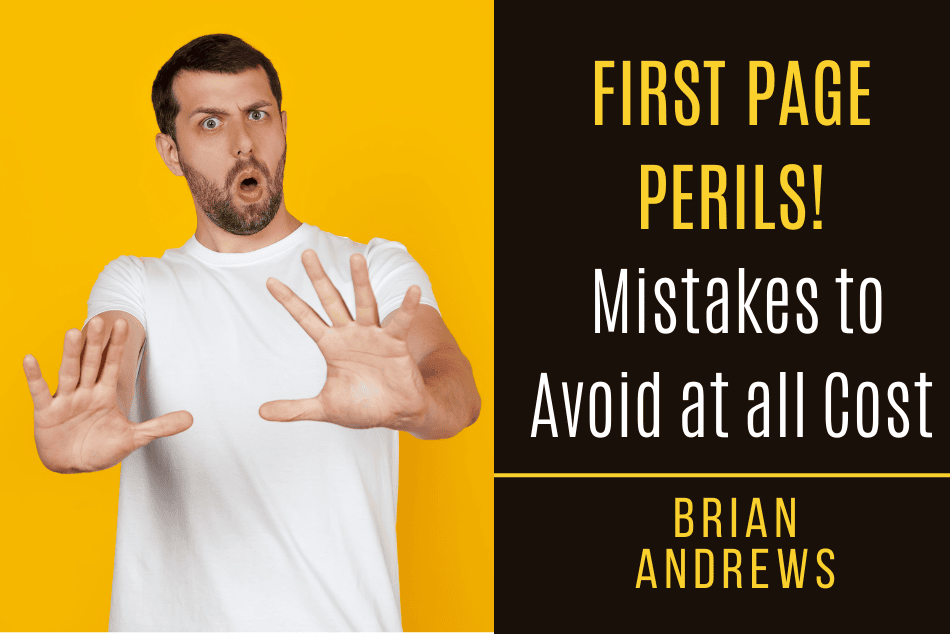Everyone knows the age old adage: You don’t get a second chance to make a first impression. This expression holds true in dating and in sales, but also in publishing. Whether you’re an aspiring author or looking to sell your umpteenth novel, the same rules apply.
If the first page doesn’t hook the reader and hit all the right notes right out of the gate, then the reader will stop reading. Agents and editors don’t have the time or desire to buy a book that screams amateur, and potential book buyers will not spend their money on a story that does not inspire. But have no fear, the Career Authors are here to share our tried and true formula to avoid common pitfalls that have derailed many a hopeful, yet uninformed author.
Mistake #1: Not Introducing the Main Character Promptly
One of the most irritating mistakes an author can make is failing to introduce the book’s protagonist (or POV character for the opening chapter if not the protagonist) promptly. And by promptly, I mean within the first paragraph of the opening chapter.
Many novice authors are under the mistaken impression that it creates suspense or intrigue to keep the reader in the dark about whose headspace they are in. Trust me, it does not. The only thing it does is create confusion and test the reader’s patience.
By the end of the first page we need to know the character’s name and gender and preferably have a sense for their approximate age and profession (or lack thereof). As authors, our job is to give our readers the opportunity to live in another person’s body and mind, but we can’t go on a journey with a character who can’t imagine, describe, understand, or relate to.
Mistake #2: Not Establishing Setting
Imagine if your best friend returned from a wondrous vacation and proceeded to tell you all the incredible things she experienced on the trip, but refused to tell you where she went. Preposterous, right? Absolutely because as we all know, that’s the first detail people communicate. A trip to Hawaii is a very kind of vacation from a visit to Iceland, so knowing that information right away allows the listener to properly imagine the surroundings and activities with both verity and accuracy.
So why, then, do so many authors not establish setting on the first page of their novel? By the end of the first page we need to have a sense of the time of day and the character’s immediate surroundings. It’s not required but it’s also nice to have clues about the time period, geographic location, seasonality and weather.
Mistake #3: Not Understanding the Fundamentals of Point of View
Every year at the Career Authors Annual Endicott Writing Retreat, we read aspiring author’s first pages and provide feedback. And every year the number one mistake we encounter is poorly executed point of view (POV). Nothing will earn your querying manuscript a rejection faster than POV mistakes, which include:
(1) “Head hopping” from one character’s POV to another in the same scene
(2) Drifting in and out of third person “omniscient”
(3) Slipping between first and third person POV
We have many, many posts on Point of View on this blog, so if you’re new to writing and don’t have a firm grasp on what POV is and how to execute it, then I encourage you to study and level up. I promise you won’t regret it!
Mistake #4: The Dreaded “Data Dump”
Imagine you’re watching the Summer Olympic Games. The world’s fastest runner is predicted to break the world record and take gold in the 100m dash. The crowd is cheering. The anticipation is off the charts. The runners take their positions in the starting blocks, flexing their muscular, finely tuned physiques.
On your mark, get set, GO!
The runners are off and the world’s fastest man is pulling ahead of the pack when…the network cuts from the race to a piece about the athlete when he was a young boy growing up in Alabama and proceeds to give you ten minutes of backstory about how and why he became a sprinter. What the $@^*&!
This would never happen in the middle of the most exciting race in the world. So why do so many aspiring authors do this exact thing on the second half of their first page? No one knows, but people still do it.
The first page of a novel needs to be driving forward with interest and energy. Don’t break or interrupt the action of the present to take us on a detour to the past. No data dumps, no backstory, no flashbacks on page one allowed.
Mistake #5: A Weak or Non-existent Hook
Every huge bestselling book, in the history of huge best selling books, kicks things off with a hook. There are dozens of different kinds of hooks, and the vast majority of hooks are simple, but you must have one.
What is a hook you ask? Well, let me tell you:
A hook is a question or construct that piques the readers curiosity and makes them want to learn more.
In a mystery novel, the hook is “whodunnit?” In a thriller, it’s the signal that something bad is going to happen and the hero has to stop it. In a romance, it’s the tease that two people who are not in love are could (and hopefully will) fall in love. Every genre has genre hooks, and your job as the author is to hook the reader on page one with character in a situation that overtly, or subtly, makes the reader want to find out what happens next.
If you’re jonesing to read MORE about First Page Pitfalls, check out last year’s article by HPR! Otherwise, head on over to Facebook and continue the conversation on this topic.





